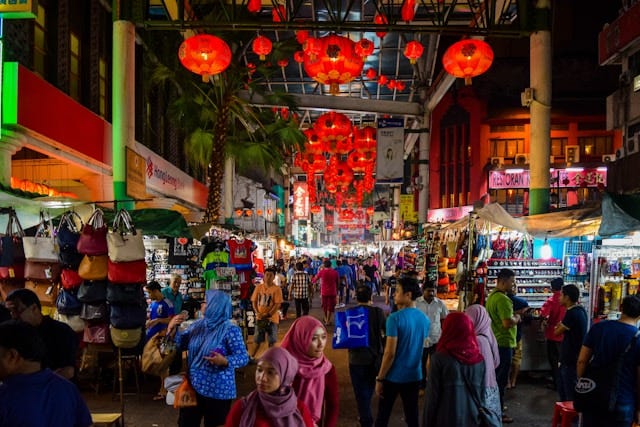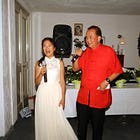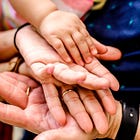Disclaimer: I am writing from my small perspective of how it is to be one Chinese-Malaysian growing up in the 90s in Taiping and later living in KL; it is by no means representative of the rest of the people in Malaysia. I am not a political researcher nor a historian, so my view here is a very personal one, and I may very well be wrong about many things. Also, I am from northwest Peninsular Malaysia, so it is again narrowed down and does not represent the rest of Malaysia.
A post by Noha Beshir, writing positively about being asked where she’s from through her experience, inspired me to write this article. Is it okay to ask someone where they are from, especially if it is due to genuine curiosity? For me, it’s less about being singled out as not being from “here” and more about it being a little complicated to answer.
“Where are you from?” a young Cambodian boy asked me in his limited English as his younger sister shyly hid behind him on the motorbike. “Malaysia,” I said, answering factually and directly. That was where I was born and raised and lived until then.
They then invited me to join them in exploring the little island we had just arrived on a boat from Kampong Cham, where they must have watched, embarrassed for me possibly, as I almost hit a cow with my motorbike while boarding with the herd of motorists, animals, wagons and people. This is also the first time I am riding a motorbike, which, just minutes before, I had a short lesson about, in French, from the person I rented it from. “Arrêt! Arrêt!” rang in my mind as my motorbike headed for the cow’s behind.
As we meandered across the sleepy villages on the island, we often stopped to greet the locals. I heard him pointing to me mid-conversations, declaring, “Malay! Malay!” and no doubt answering others about where I am from. I cringed every time I heard it because, no, I am not a Malay, even though it’s in the name. For minorities like me, distinguishing between Malay and Malaysian is crucial, a delicate balance between identity and belonging.
Away from home
I have lived in Germany for over eight years now, and it’s interesting to reflect that I’m rarely asked directly where I am from - a nod perhaps to the German’s careful avoidance of potentially sensitive topics. Friends might ask that once we got closer or if conversations happened to steer that way. I often share my background where relevant for the listener's sake, so they don’t have to wonder if it is ok to ask, “Where are you from?”
The question 'Where are you from?' frequently arose during my travels, driven no doubt by genuine curiosity and a desire to connect. The problem lies with me, as the answer does not come easy. My reply, “Malaysia,” is usually met with puzzled looks due to my appearance - I come from Malaysia’s significant Chinese minority. If the person lacked familiarity with Malaysia’s diversity, which is unfortunately often, I would then clarify, “I’m a Malaysian-Chinese1.” This would lead to further questions, prompting me to reluctantly give my default answer, “My grandparents came from China,” finally triggering the look of acceptance.
My personal identity crisis
So what is the problem with me having to answer that I am a Chinese-Malaysian and having to give out the fact that my grandparents are from China (which is not entirely true because my paternal mother was born in Malaysia, but this would complicate the conversation with a stranger too much)? I think the problem was the unease I would feel having to go through this “self-interrogation” because where am I really from?
I struggle with this myself because I do not feel entirely belong where I am from. We were somehow segregated by our race. I am Chinese-Malaysian, and I have Indian-Malaysian friends, and then there are the Malays. I haven’t even gotten into the other indigenous races in Malaysia from the Borneo side. I am from West Peninsular and am writing about my experiences in this part of Malaysia. Yes, Malaysia has two sides, which will also be a story for another day.
So why do I find it uneasy to say I am a Chinese-Malaysian? Because this inevitably will remind me how race-based my country is. Why don’t we minorities just say we are Malaysian? The problem lies therein that the majority, which is Malay and some indigenous people, are given the Bumiputera status2, granting them special privileges.
This caused me to feel like an adopted child of the family despite being a third-generation Chinese in Malaysia.
The first time this innocent child’s heart was broken was when she, during her hopeful university applications after studying endless nights for good results, was told in the face that she might get in if the quota was enough. “What quota?” the young me asked, incredulous. The non-bumiputeras are given a smaller quota to the public universities, so the competition for placement and subject choices are very high.
I remember it took me a long time to recover from this revelation. I got bitter because I had been living in an illusion all along. I was just adopted, and I better take my place. And that was the first of such encounters in my Malaysian life.
In my motherland
I feel a twinge of envy whenever I hear someone declaring where they are from with a sense of pride, a sentiment I struggle to share. The closest I have to this feeling is when I tell someone, usually within Malaysia itself, “I am from Taiping.” I do reply to this question with pride. There will be this instant bond if I meet a fellow Taipingite in Malaysia or abroad.
To make matters worse, Taiping was a bubble for me. It was never a representation of Malaysia. There were too many Chinese, at least during the 90s when I was growing up. My friends were all Chinese, and later on in high/secondary school, most of the Malays went off to their special schools, so “we” became the majority.
Even after I finally got into a university, it was one set up by the Chinese political party in Malaysia, so you guessed it, the majority of the students were Chinese. Then I graduated and started working, only to find myself working with many Chinese. I am not sure whether it was due to the popularity of the IT field among the Chinese or some systematic racism is also happening, and I happened to now profit from it.
During my wedding in Malaysia, my father-in-law turned to my mother-in-law and remarked, “My son is marrying a Chinese (not a Malaysian). This is because Chinese people had surrounded him since he came to Taiping a week ago. Granted, my family is, after all, a big one. My father had six siblings while my mum has seven, so of course, we were surrounded by Chinese people, but still, my father-in-law was right.
Though this remark did make me laugh, it was also tinged with a melancholy discomfort that I, a Malaysian, have not ventured out of my bubble enough to be a Malaysian. But what is a Malaysian? Don't get me wrong. I have Malay friends and Indian-Malaysian friends, too. It’s just that they are a handful compared to my circle of influence.
It is a two-way street when it comes to relationships, and so it is with Malaysia and me. We have both failed each other in this sense.
Being Chinese
Do I want to just call myself a Malaysian and drop the “Chinese” from it? Honestly, no, because I also strongly identify as Chinese. Although I have previously written about discovering our differences while traveling in China, I have still inherited the culture of my ancestors, which can be as old as 4000 years old. And I am proud of that. I embody and practice a large part of Chinese culture daily, consciously or not.
That is why it is complex being a Chinese-Malaysian. On one side, I identify as Chinese; on the other, I want to identify as Malaysian.
We celebrate the Chinese New Year and all the other cultural festivals, and many of us also practice Buddhism or Taoism. Though I do not practice them actively, they influenced me greatly during my childhood and even now in my life.
I speak Cantonese to my children because I want to pass on my heritage language to them. Besides, it’s a gift; I am grateful to have grown up bilingual in Cantonese and English, and I started learning Malay and all the other dialects in Malaysia through friends at 7. Even now, when I want to introduce rituals to my children, I think of all the Chinese Festivals from my childhood. I cook Cantonese food frequently; my comfort food is noodle soup, and my children’s favorite is Hainanese Chicken Rice with soup!
Celebrating Malaysia’s Diversity
Growing up as a minority in Malaysia, though a major one, heightened my sensitivity to cultural differences and fostered tolerance. I cherish the diverse aspects of being Malaysian—our rich array and fusion of food from various ethnicities, the multi-festivals we celebrate all year round, the beautiful clothing styles representing different cultures, and, for someone who loves words, the daily exposure to multiple languages from young.
As a fellow Malaysian, Elizabeth Tai, wrote, most of us can speak multiple languages! We can code switch and sometimes even mash everything into one sentence casually, like this popular Internet quote - “Wei macha, you want to makan here or tapau?" (Hi bro, do you want to eat here or take away?).
Our food is as varied as our languages, and it is delicious. Don’t get me started on Nasi Lemak, Roti Canai, and Bak Kut Teh. With that, I have only begun to chip a stone off the mountain, which is Malaysian food. Come visit Malaysia and try them yourself! And to any Malaysian readers from Borneo, please share your favorite foods in the comments.
The various races in Malaysia uphold their tradition and celebrate their festivals, resulting in a cultural tapestry. Growing up, I was constantly reminded of the beauty of multicultural Malaysia and the freedom to embrace our identities and religious practices. This inclusivity is one of the greatest joys of being Malaysian.
These are all the good things about being a Malaysian, and in many ways, I would not trade that for anything else. I yearn for a more cohesive multicultural family without anyone feeling as adopted. I wish Malaysia and I could have deeper reciprocal love and respect for each other.
So, should you ask me where I am from?
Yes, you should, and you certainly can. I trust you ask from a place of genuine curiosity and with the intent to get to know me better. How would I answer you now if you asked me that?
The current most satisfying answer to both the asker and myself came from my husband. He had answered for me numerous times, often because someone may find it easier to ask him instead, and he would say, “A Malaysian with Chinese heritage.”
I find this answer removed the political and social relationship issues I have with Malaysia and focused on both things that I want to identify with - I am a Malaysian who embodies her Chinese heritage.
Please share your thoughts:
Have you ever struggled to answer the question, 'Where are you from?'
Do you feel like part of multiple cultures without fully belonging to any, and what has your journey been like in finding belonging?
More from my personal essays:
Both Malay and Mandarin work on the premise of “noun-first, adjective-after,” it’s no wonder that in colloquial Malaysian English, it’s more common to simply say “Malaysian Chinese” when referring to Malaysians of Chinese descent. [1]
Bumiputera status in Malaysia refers to a designation given to certain ethnic groups, including the Malays and various indigenous peoples of Peninsular Malaysia and East Malaysia. This status is part of Malaysia's affirmative action policies intended to improve the socioeconomic position of these groups through privileges like education quotas, business parks, and property discounts. Originating in the 1970s to ease ethnic tensions, these policies recognize the "special position" of Bumiputeras, aiming to create socioeconomic advancements but have also sparked discussions on racial and ethnic identity in Malaysia. [1][2]








Hey Rachel, first of all, thank you for writing this. It's incredibly educational for those unfamiliar with Malaysian culture.
As a fellow Chinese Malaysian, I've always struggled with my identity. Growing up in a place where you're identified as part of a community that 'doesn't belong' is strange. I had the opportunity to attend various types of schools, but I was still conflicted about my understanding of who I am and what I represent. It's tiring to be continuously told to be 'more Chinese' and 'more Malaysian' simultaneously. Even more so when we must disclose our race on many official channels.
I've spent the entirety of my adulthood outside of Malaysia, which somehow made things more convenient, as I identified as an immigrant. London is an incredibly diverse and accepting city, with so much Malaysians can learn from. I'll never forget this one encounter on the train with a stranger in the UK, who, after patiently listening to my detailed explanations of my origins, said to me, 'You're Malaysian'.
On the Chinese part, I recently revisited China for an extended period. In some ways, it gave me a lot of clarity and got me closer towards my heritage, which I shunned growing up. It's something I'd recommend every Chinese Malaysian to do at least once.
Cultures have no good or bad sides; I take what I value from every culture and piece it together as a part of me.
These days, I identify myself simply as a 'Malaysian and a Londoner' because they've both shaped who I am today. Although I'm not the best 'Malaysian' or 'Chinese', I'm significantly more open to being in touch with my roots, and I intend to take more frequent trips to China.
I don't feel obliged or pressured to conform anymore, nor do I have to pick sides, particularly on the Malaysian vs Chinese front. It's liberating.
It’s been a pleasure to read your article!
The brain drain is real. I remember seeing somewhere that the chinese population in Malaysia used to make up ~30% of the population and now it is around 20%, which is really sad. I am a product of that brain drain… my parents migrated to HK so I spent my formative years here and continue to work here, and one thing that I feel from my parents’ as well as people who have left is that we love Malaysia, but that feeling may not be requited 😅
One thing that my husband and I like talking about is how what goes around comes around, as he is from China, and when we actually compare our ancestors’ hometowns in China they are literally next to each other on the map. I used to always wonder what would have happened if my great-grandparents decided not to take the boat journey down south or have floated to Thailand or Indonesia instead, but seeing as wherever our ancestors have stayed, their descendants both end up HK so maybe things would just have come full circle 😌 also who knows what migration patterns may come in the future~